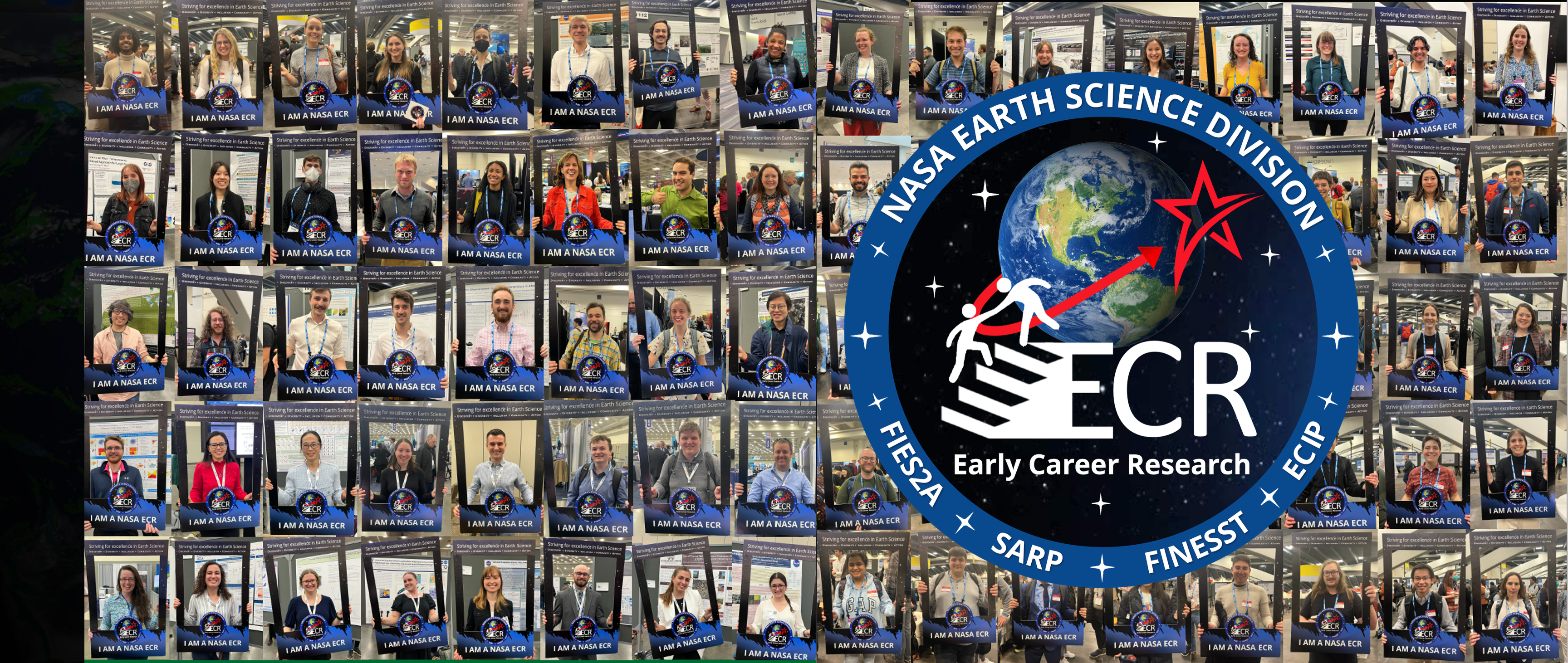Are you an educator, high school student, community college student, undergraduate student, graduate student, or someone in the early stage of their career looking to do research focused on NASA Earth Science? If so, NASA’s Earth Science Division (ESD) has a variety of opportunities for you.
The Early Career Research (ECR) Program’s vision is to empower the next generation of Earth science researchers to create a workforce that enables solutions to benefit society, respond to changes in the Earth’s system, and to support the Earth Science to Action. ECR is striving for excellence in Earth science sharing these core values.
- Discovery - Support outstanding and innovative scientific research to advance NASA's mission in Earth System Science.
- Participation - Enable greater participation in Earth Science by cultivating scientific leadership.
- Community - Develop sustained relationships for collaboration and support.
- Action - Make Earth science data more usable and impactful for the benefit of humanity.
These values help build a foundation to achieve excellence in Earth Science.
ECR is opening new doors and creating new opportunities with the following programs.
Note: Application and proposal requirements may change on a yearly basis. See individual program websites for additional details and official deadlines.
First Immersion in Earth Science to Action
The First Immersion in Earth Science to Action (FIES2A) provides an opportunity for young Earth science-interested students, including community college and undergraduate students to get immersed in a workforce development opportunity at one of NASA’s Centers to conduct research focused on the Earth Science to Action (ES2A) initiatives. Research areas include looking at the atmosphere, the biosphere, the cryosphere/geosphere, the hydrosphere, and data/modeling.
Summer 2026 offers 6 exciting projects across the Earth Sciences Research Spheres and Data/Modeling! Project Descriptions can be found on NASA's STEM Gateway.
Applications are due February 27.
IMPORTANT: It is a requirement to be onsite, pay close attention to the Center location to which you are applying. NASA does NOT cover travel or housing costs.
- Hydrosphere - focused on tropical cyclones
- Atmosphere - focused on air quality trends and drivers in Mexico City and Atlanta
- Biosphere - focused on harmful algal blooms
- Crysophere - focused on the role of glaciers in river discharge worldwide
- Data/Modeling - focused on big-data analysis and cloud computing
- Geosphere - focused on spaceborne and airborne lidar data geolocation
Join us this summer and get immersed in NASA Earth Science!
Student Airborne Research Program
The Student Airborne Research Program (SARP) is an eight-week summer internship program for rising-senior undergraduates. SARP is a unique NASA internship that gives the students hands-on experience in Earth system science research as, well as in all aspects of a scientific campaign.
The NASA Airborne Science Program maintains a fleet of aircraft used for studying Earth system processes, calibration/validation of space-borne observations, and prototyping instruments for possible satellite missions. SARP participants assist in the operation of instruments onboard one of these aircraft.
Research areas include atmospheric chemistry, air quality, forest ecology, soil moisture, and ocean biology.
How to apply
For descriptions of the research opportunities, deadlines, and application, visit SARP. For questions, please contact the SARP Team.
Future Investigators in NASA Earth and Space Science and Technology
The Science Mission Directorate (SMD) Future Investigators in NASA Earth and Space Science and Technology (FINESST) solicitation provides NASA research grants for graduate students (Future Investigators), with a faculty mentor as Principal Investigator. These projects are graduate student-designed and performed research projects. Five SMD divisions at NASA Headquarters, i.e., Astrophysics, Biological and Physical Sciences, Earth Science, Heliophysics, and Planetary Science, conducted/provided oversight for the review and selection process.
At the Earth Science Division, FINESST24 projects vary in topic from looking at data systems and technology, putting Earth science research into action, and understanding components of the Earth system. The awards are up to 3 years and up to $50K per year.
How to apply
The FINESST25 solicitation has not been released to date; however, when final dates are established, this program element will be amended, full information will be provided in a revised solicitation document, and the close date will be changed to reflect the proposal due date. Applications will be submitted through the NASA Solicitation and Proposal Integrated Review and Evaluation System (NSPIRES).
For questions, please contact the ECR Team.
Early Career Investigator Program in Earth Science
NASA’s Early Career Investigator Program in Earth Science (or ECIP-ES), formally known as the New (Early Career) Investigator Program in Earth Science (or NIP), welcomes innovative research initiatives and seeks to cultivate scientific leadership in Earth System Science, specifically for those just having received their PhD.
Projects focus across ESD priorities such the investigator’s ability to promote and increase the use of space-based remote sensing, the integration of space-based remote sensing data with other datasets (e.g., surface, air) and into models, and the delivery of actionable Earth science ― making Earth science data more usable and impactful for the benefit of humanity.
How to apply
The ECIP-ES solicitation closed August 11, 2023. Proposals are solicited every 3 years. Award duration can be for up to 3 years. Opportunities will be announced on NSPIRES.
For questions, please contact the ECR Team.
Other Opportunities
There are other additional internships and opportunities at NASA, outside of the Early Career Research Program for those in the early stages of their career.
- NASA Postdoctoral Program (NPP) spend several years with scientists and engineers at NASA centers and institutes working on assignments in Earth and space sciences, aeronautics, space operations, exploration systems, and astrobiology.
- Research Opportunities in Space and Earth Science (ROSES) are awards that range from under $100K per year for focused, limited efforts (e.g., data analysis) to more than $1M per year for extensive activities (e.g., development of hardware for science experiments and/or flight). Periods of performance are typically three years, but some programs may allow up to five years and others specify shorter periods.
Training and Resources
- NASA’s Earthdata Webinars provide online seminars and workshops feature experts in various disciplines who share their knowledge in a particular subject area, from data in the cloud to specific data tools.
- NASA’s Applied Remote Sensing Training (ARSET) trains people to use Earth-observing data into their environmental management and decision-making.





























